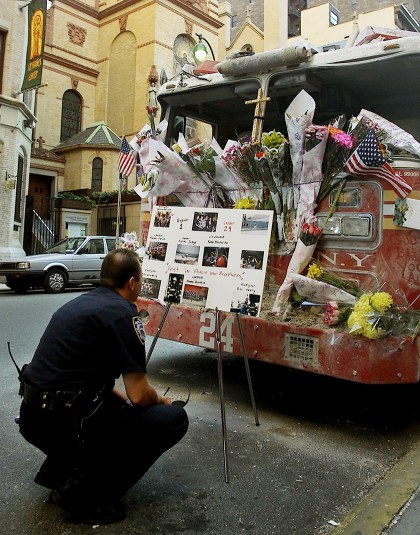Two Decades Later, the Enduring Legacy of 9/11
SEPTEMBER 11, 202
Americans watched in horror as the terrorist attacks of Sept. 11, 2001, left nearly 3,000 people dead in New York City, Washington, D.C., and Shanksville, Pennsylvania. Nearly 20 years later, they watched in sorrow as the nation’s military mission in Afghanistan – which began less than a month after 9/11 – came to a bloody and chaotic conclusion.
The enduring power of the Sept. 11 attacks is clear: An overwhelming share of Americans who are old enough to recall the day remember where they were and what they were doing when they heard the news. Yet an ever-growing number of Americans have no personal memory of that day, either because they were too young or not yet born.
A review of U.S. public opinion in the two decades since 9/11 reveals how a badly shaken nation came together, briefly, in a spirit of sadness and patriotism; how the public initially rallied behind the wars in Afghanistan and Iraq, though support waned over time; and how Americans viewed the threat of terrorism at home and the steps the government took to combat it.
As the country comes to grips with the tumultuous exit of U.S. military forces from Afghanistan, the departure has raised long-term questions about U.S. foreign policy and America’s place in the world. Yet the public’s initial judgments on that mission are clear: A majority endorses the decision to withdraw from Afghanistan, even as it criticizes the Biden administration’s handling of the situation. And after a war that cost thousands of lives – including more than 2,000 American service members – and trillions of dollars in military spending, a new Pew Research Center survey finds that 69% of U.S. adults say the United States has mostly failed to achieve its goals in Afghanistan.
A devastating emotional toll, a lasting historical legacy
Shock, sadness, fear, anger: The 9/11 attacks inflicted a devastating emotional toll on Americans. But as horrible as the events of that day were, a 63% majority of Americans said they couldn’t stop watching news coverage of the attacks.
Our first survey following the attacks went into the field just days after 9/11, from Sept. 13-17, 2001. A sizable majority of adults (71%) said they felt depressed, nearly half (49%) had difficulty concentrating and a third said they had trouble sleeping.
It was an era in which television was still the public’s dominant news source – 90% said they got most of their news about the attacks from television, compared with just 5% who got news online – and the televised images of death and destruction had a powerful impact. Around nine-in-ten Americans (92%) agreed with the statement, “I feel sad when watching TV coverage of the terrorist attacks.” A sizable majority (77%) also found it frightening to watch – but most did so anyway.
Americans were enraged by the attacks, too. Three weeks after 9/11, even as the psychological stress began to ease somewhat, 87% said they felt angry about the attacks on the World Trade Center and Pentagon.
Fear was widespread, not just in the days immediately after the attacks, but throughout the fall of 2001. Most Americans said they were very (28%) or somewhat (45%) worried about another attack. When asked a year later to describe how their lives changed in a major way, about half of adults said they felt more afraid, more careful, more distrustful or more vulnerable as a result of the attacks.

Even after the immediate shock of 9/11 had subsided, concerns over terrorism remained at higher levels in major cities – especially New York and Washington – than in small towns and rural areas. The personal impact of the attacks also was felt more keenly in the cities directly targeted: Nearly a year after 9/11, about six-in-ten adults in the New York (61%) and Washington (63%) areas said the attacks had changed their lives at least a little, compared with 49% nationwide. This sentiment was shared by residents of other large cities. A quarter of people who lived in large cities nationwide said their lives had changed in a major way – twice the rate found in small towns and rural areas.
The impacts of the Sept. 11 attacks were deeply felt and slow to dissipate. By the following August, half of U.S. adults said the country “had changed in a major way” – a number that actually increased, to 61%, 10 years after the event.
A year after the attacks, in an open-ended question, most Americans – 80% – cited 9/11 as the most important event that had occurred in the country during the previous year. Strikingly, a larger share also volunteered it as the most important thing that happened to them personally in the prior year (38%) than mentioned other typical life events, such as births or deaths. Again, the personal impact was much greater in New York and Washington, where 51% and 44%, respectively, pointed to the attacks as the most significant personal event over the prior year.
Just as memories of 9/11 are firmly embedded in the minds of most Americans old enough to recall the attacks, their historical importance far surpasses other events in people’s lifetimes. In a survey conducted by Pew Research Center in association with A+E Networks’ HISTORY in 2016 – 15 years after 9/11 – 76% of adults named the Sept. 11 attacks as one of the 10 historical events of their lifetime that had the greatest impact on the country. The election of Barack Obama as the first Black president was a distant second, at 40%.
The importance of 9/11 transcended age, gender, geographic and even political differences. The 2016 study noted that while partisans agreed on little else that election cycle, more than seven-in-ten Republicans and Democrats named the attacks as one of their top 10 historic events.





